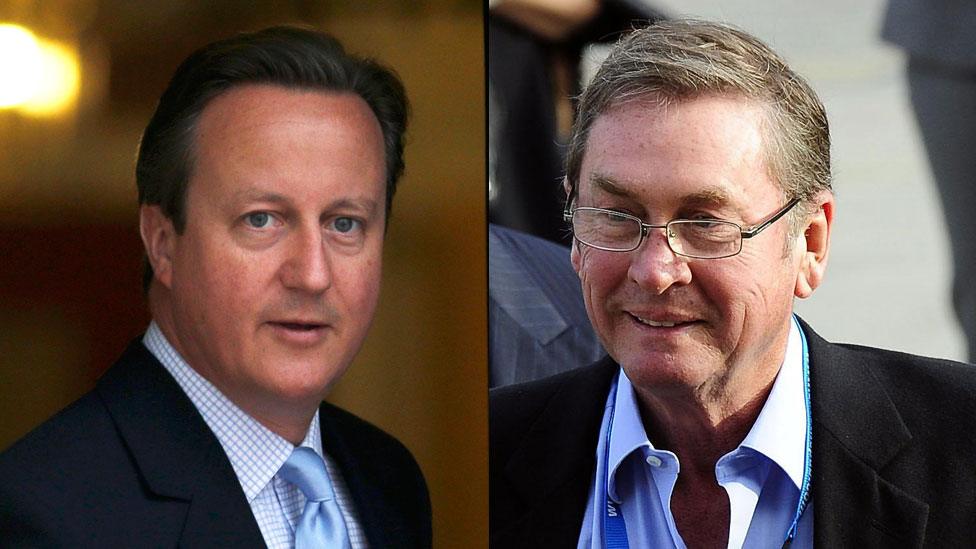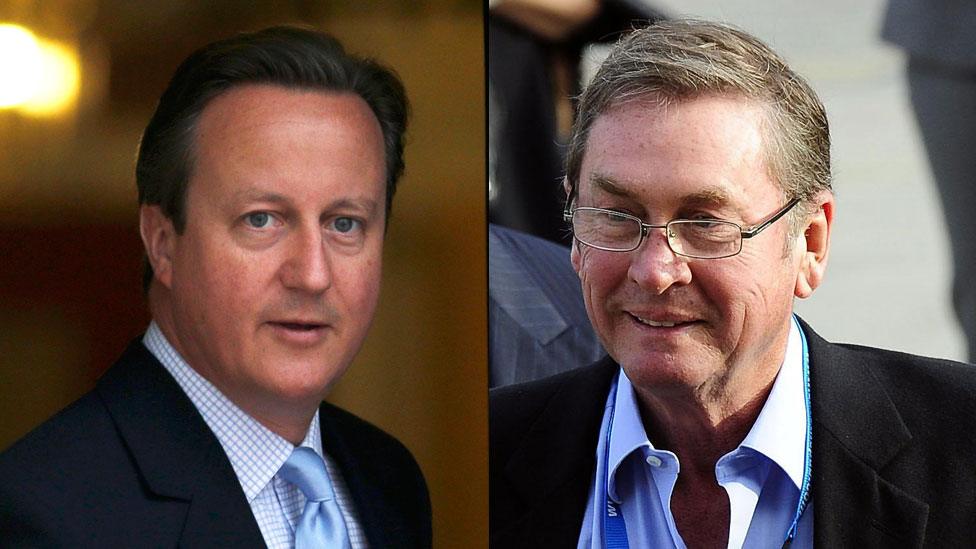Ashcroft and Cameron - an inevitable end?
- Published

Two powerful men need each other, and then one of them becomes more powerful, and doesn't need the other anymore.
The understanding which they had comes to break down, recriminations follow, and sometimes, full throttle revenge.
But the roots of the embarrassment that has sent social media into overdrive in the last day were laid before Twitter was invented.
In fact, the origins of the spectacular parting of ways are fifteen years ago.
Notwithstanding the stink the allegations former Conservative donor Lord Ashcroft makes in his new book about David Cameron's high jinks at university, the stories are the final, and maybe inevitable end of a tortured relationship that has dogged the Conservative Party for many years.
And although Lord Ashcroft denies it, it looks a lot like revenge.
While Downing Street does not want to "dignify" the more salacious claims which may have more impact in the public's minds, what may prove trickier in the long run is what Lord Ashcroft claims about his tax status.
David Cameron came into politics making, as new leaders tend to, all sorts of claims about how he wanted to clean things up; he wanted a new kind of politics (just in case you'd been wondering, Jeremy Corbyn wasn't the first).
But he inherited a tricky situation from his predecessor, William Hague - a relationship with an extremely wealthy and eager backer, Lord Ashcroft, who after concerns in the Civil Service about his tax status made this promise to the-then Tory leader back in 2000.
"The undertakings I gave were confirmed in a memorandum to William Hague dated 23 March 2000.
"These were to 'take up permanent residence in the UK again' by the end of that year… In subsequent dialogue with the government, it was officially confirmed that the interpretation in the first undertaking of the words 'permanent residence' was to be that of 'a long term resident" of the UK.
"I agreed to this and finally took up my seat in the House of Lords in October 2000'."
That deal was not publicly known, and after David Cameron took over in 2005, with his promises of new, more transparent ways of doing things, questions about Lord Ashcroft and his tax affairs continued.
The Conservatives needed him, as all political parties need money, and between 2002 and 2011 he gave more than £5m.
Enduring headache
But the scrutiny over his affairs was a headache that refused to disappear.
Some Conservative MPs at the time wondered privately if the relationship was really worth it.
Labour, despite their own woes over party funding, asked again and again about Lord Ashcroft's finances - was he paying tax in this country as he ought to as a member of the Lords?
Those questions in the end led to the peer and the Conservatives publishing the details of his non-dom status, external just before the election in May 2010.
And the focus on Lord Ashcroft probably led to changes in the law around non-doms.
But the attention and embarrassment of the whole affair meant, for some Conservatives, that Lord Ashcroft was seen as tainted.
His money had certainly been useful, but there was no way he could be given a major role in government if and when they won.
As is clear from his account of events published today, the job he says he was offered after the 2010 election was seen as derisory, not fitting a donor of his stature.
But once the Conservatives were in government, the political baggage that came with his cash meant it was perhaps no longer worth keeping him close.
David Cameron won't be able to avoid answering again similar questions to those he had to back then.
When did Lord Ashcroft tell him about his tax affairs? How could he really not have known?
Did he really never ask until just before their publication in 2010?
But Downing Street's hope is that the former peer's agenda is so clear, that the pressures pass.
But with more to come from Lord Ashcroft's book, there'll be nerves too about what comes next.
- Published21 September 2015
